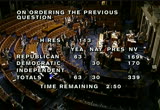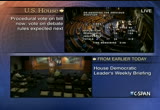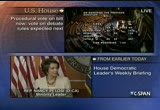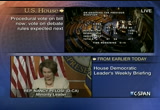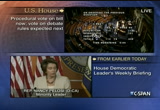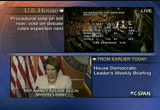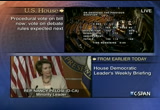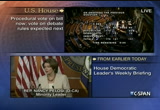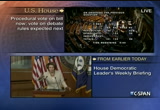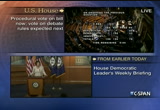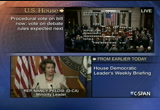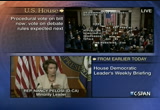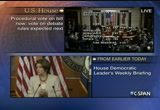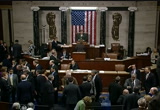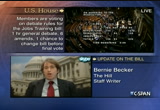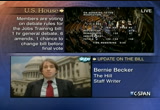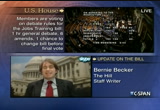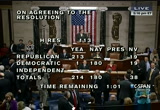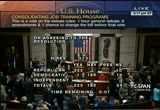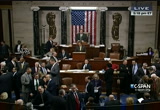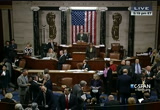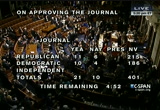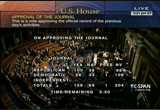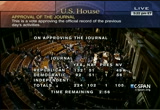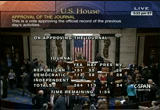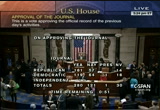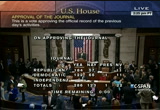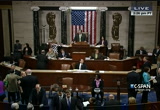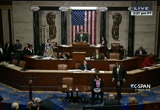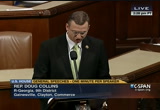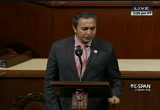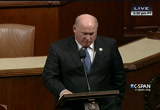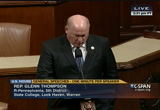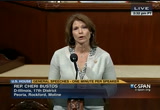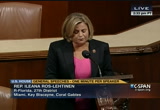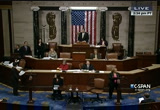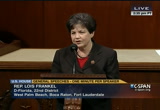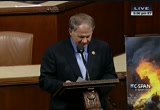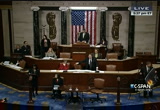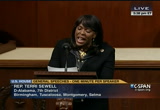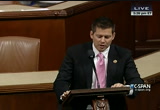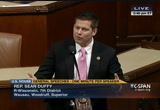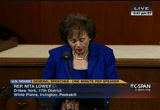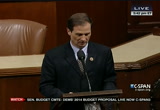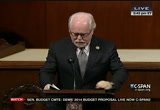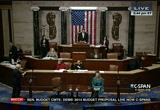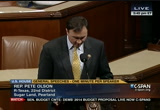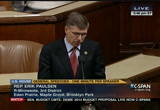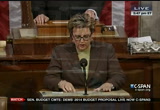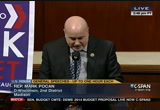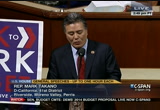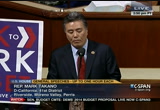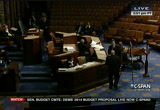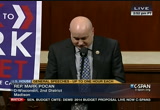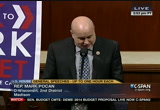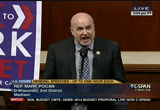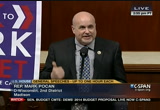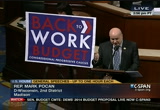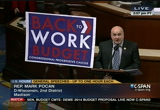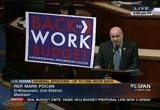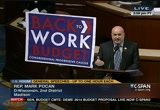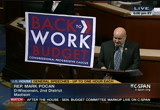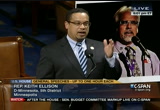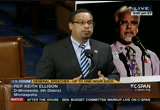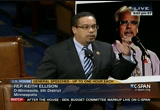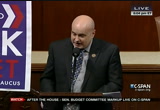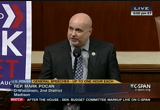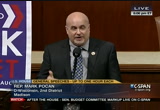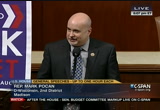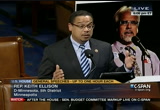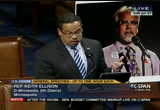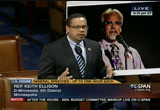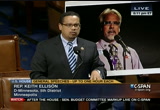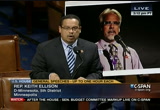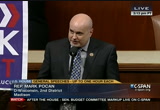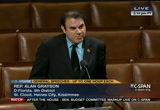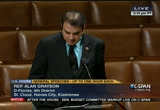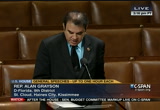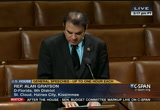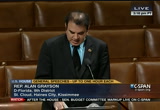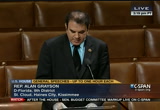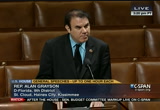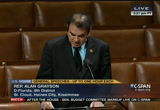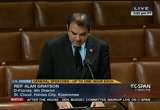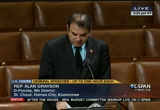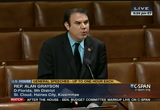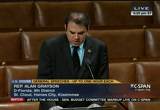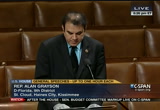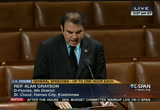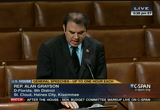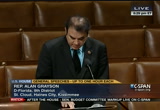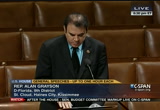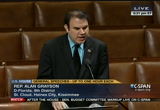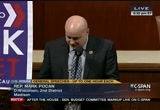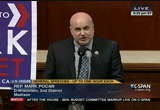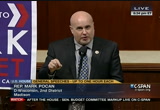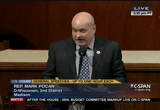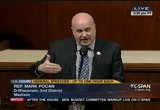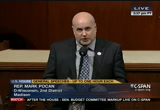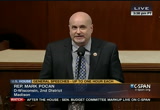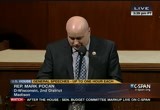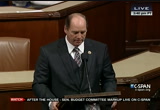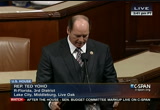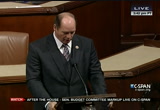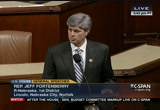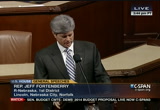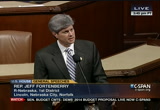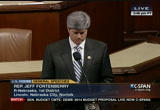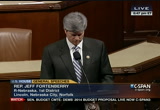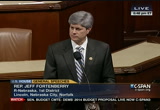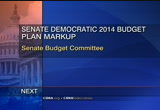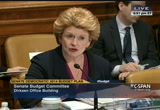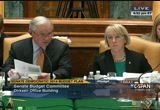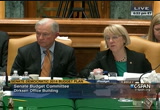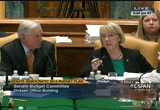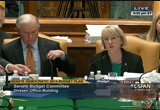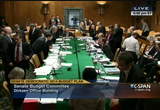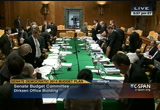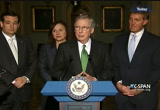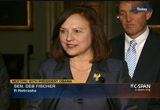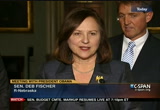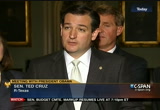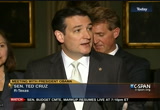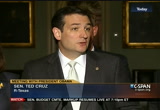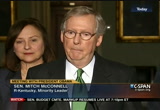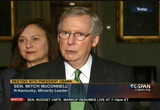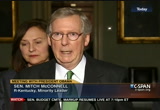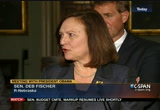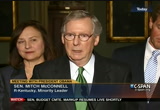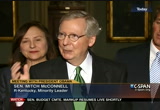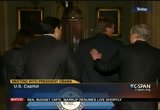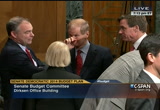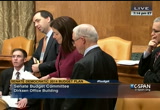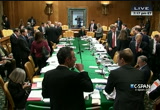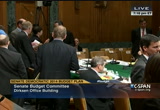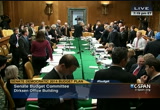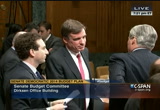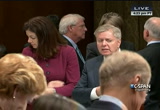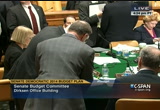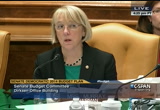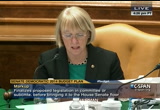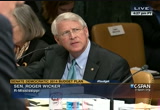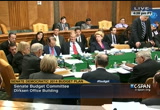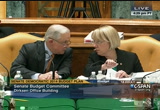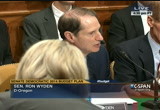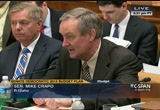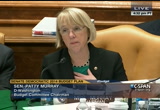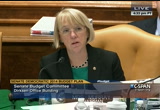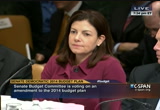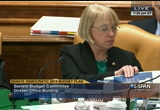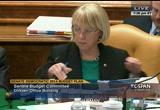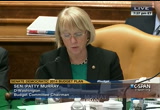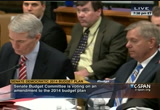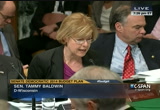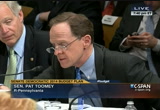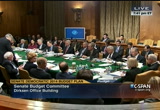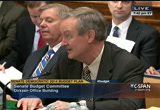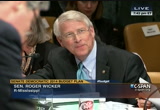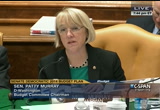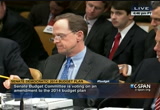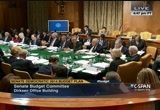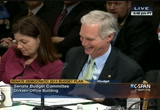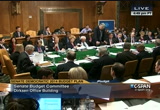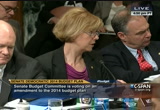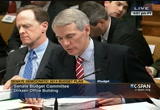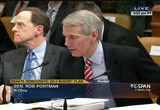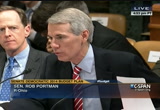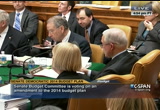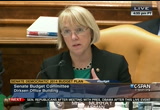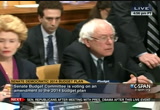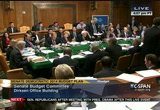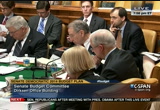tv Public Affairs CSPAN March 14, 2013 5:00pm-8:00pm EDT
5:12 pm
the speaker pro tempore: on this vote, the yeas are 225, the nays are 191. the previous question is ordered. question is on adoption of the resolution. those in favor say aye. those opposed, no. in the opinion of the chair, the yeas have it. >> on that i request a recorded vote. the speaker pro tempore: a recorded vote has been requested. those in favor of a recorded vote shall rise and remain standing. a a sufficient number having arisen, a recorded vote is ordered. this is a five-minute vote. [captioning made possible by the national captioning institute, inc., in cooperation with the united states house of representatives. any use of the closed-captioned coverage of the house proceedings for political or
5:19 pm
5:20 pm
laid on the table. pursuant to clause 8 of rule 20, the unfinished business is the -- the question is on agreeing to the speaker's approval of the journal which the chair will put de novo. those in favor say aye. those opposed, no. in the opinion of the chair, the ayes have it. mr. polis: mr. speaker. the speaker pro tempore: the gentleman from colorado. mr. polis: i request a recorded vote. the speaker pro tempore: those in support of a request for a recorded vote will rise will rise and remain standing until counted. a sufficient number having arisen, a recorded vote is ordered. members will record their votes by electronic device. this will be a five-minute vote. [captioning made possible by the national captioning institute, inc., in cooperation with the united states house of representatives. any use of the closed-captioned coverage of the house proceedings for political or commercial purposes is expressly prohibited by the u.s. house of representatives.]
5:26 pm
5:27 pm
the house will be in order. members, please remove onversations from the floor. the chair will entertain one-minute requests. for what purpose does the gentleman from georgia rise? >> to address the house for one minute and to revise and extend my remarks. the speaker pro tempore: without objection. >> thank you, mr. speaker. i rise on behalf of georgians and folks all over the nation who are sick and tired of the budget games in washington. ask almost any american if someone spends substantially
5:28 pm
more money they take in and they'll tell you that individual will be plagued with debt and unlimited economic activity. this evades many of my colleagues in the other body. this so-called plan increases taxes by $1 trillion, proposes $100 billion on stimulus spending and will never balance. this mentality got our nation in a fiscal mess in the first place. i commend them for finally putting a budget on paper. at least they articulated where they stand. however, this administration remains delinquent in their duty to send a budget to congress. news reports indicate it may come in april if at all. they claimed that the delay is the result of congressional debate that's surrounding the fiscal cliff and disaster. mr. collins: uncertainty to buck their responsibility to craft a budget is unconscionable. attacking this body's balanced budget approach when they haven't produced their own plan
5:29 pm
veals putting their partisan politics ahead of their future. they should send to congress a balanced budget. the speaker pro tempore: the gentleman's time has expired. once again, the house will be in order. members and staff, please remove conversations from the floor. for what purpose does the gentleman from california rise? >> mr. speaker, i ask unanimous consent to address the house for one minute. the speaker pro tempore: without objection. >> the latest ryan budget is deja vu all over again. only this time it's worse for our parents and grandparents. it will turn medicare into a voucher system and leave millions without the health care they need and deserve. as a doctor, i've sat with these seniors. when they're trying to choose between one medication and another, one treatment and another and they can't afford it. mr. bera: this is just wrong.
5:30 pm
it's bad medicine. our parents and grandparents didn't work their whole lives paying into a system only to be handed a voucher that doesn't even cover the costs of needed care. if we work together, we can do better. we can lower the costs of health care. we must honor the promises that we made to them and make sure that medicare is secure and strengthens to the next generation. mr. ryan, don't pull the plug on medicare. i yield my time back. the speaker pro tempore: for what purpose does the gentleman from pennsylvania rise? mr. thompson: ask unanimous consent to address the house for one minute and revise and extend. the speaker pro tempore: without objection. mr. thompson: mr. speaker, today or tomorrow the house will vote on the supporting knowledge and i investigating in skills act. with americans out of work and millions of job openings unfilled. the skills act will modernize our development programs and
5:31 pm
re-authorize the work force investment act. as a former member who had responsibility for administering these training opportunities, i understand these duplicative programs create. and individuals seeking training will be able to navigate the system with greater success and greater access. the skills act also refocuses the accountability and control to local level rather than washington. mr. speaker, america's competitiveness depends on having a qualified and trained work force and the skills act offers just that. president obama called on congress in 2012 to work with him to develop a skills training program that is more efficient and effective. the skills act does just that. let's take action to put americans back to work and make america more competitive. i yield back. the speaker pro tempore: the gentleman yields back the balance of his time. for what purpose does the gentlelady from illinois rise? >> permission to address the house for one minute and revise
5:32 pm
and extend. the speaker pro tempore: without objection. >> i rise to talk about a bill i introduced irlier today. the water infrastructure now public-partnership act. senator durbin and senator kirk from illinois introduced the senate version as well today. my bill would improve the nation's water infrastructure, cluding the aging loks and dams. through public-private partnerships that would expedite projects and save taxpayer money and would clear a $60 billion backlog of u.s. army corps projects that will take decades to complete without the help of private investment. mrs. bustos: does this by creating a pilot program between the army corp. of engineers through planning, design and construction methods.
5:33 pm
mr. speaker, the mississippi and illinois rivers are absolutely critical to the economic well-being of not just my region but to the entire midwest, the nation and even to the world. many of these lochs and dams were built during franklin roosevelt's era and are more than 80 years old. we must transport our goods and products worldwide. thank you very much, mr. speaker. i yield back. the speaker pro tempore: for what purpose does the gentlelady from florida rise? ms. ros-lehtinen: permission to address the house for one minute and revise and extend. ms. ros-lehtinen: every march we commemorate national women's history moncht and highlight the many contributions of women who have shaped our great nation. while we celebrate the pioneers who have paved the way, it is important to remember the young girls who need an encouraging environment so they can become strong women of character.
5:34 pm
education is key to make this happen. education is not a means to an end but a vital tool that can overcome poverty, ignorance and so much more. however one in four girls in america do not finish high school and the dropout rate is even higher for hispanic teens. nearly four in 10 hispanic girls will drop out of high school this year. this is alarming. mr. speaker, let's stop this high school dropout rate for all teen girls and i ask that we renew our commitment to put literacy on our national agenda, which is paramount in empowerment and education. i yield back. the speaker pro tempore: for what purpose does the gentlelady from florida rise? >> ask unanimous consent to address the house for one minute and revise and extend. the speaker pro tempore: without objection. ms. frankel: mr. speaker, the last memory that lynn mcdonald
5:35 pm
had of her seven-year-old daughter grace was a beaming, beautiful girl, blowing kisses to her from a bus as she went on her way to sandy hook elementary school and thereafter tragedy struck as grace and 19 of her classmates and six teachers were gunned down by a mad man with a semi-automatic rifle. and our country came together and we mourn together. i'm asking that this congress come together and do something so no other family knows the sadness of the mcdonalds. too many lives have been lost in too many communities torn apart by violence and too many families have mourned the logs of brothers and sisters and endured unimaginable pain and grief caused by gun violence. when lynn mcdonald and her husband chris came to washington for the state of the union last month, they said congress must
5:36 pm
choose action over inaction and i gee. it's been exactly three months now since the newtown massacre. for the mcdonalds and the families, let's come together and pass responsible gun safety legislation. thank you, mr. speaker, and i yield back. the speaker pro tempore: the gentlelady yields back. for what purpose does the gentleman from texas rise? mr. poe: request permission to address the house for one minute and revise and extend my remarks. the speaker pro tempore: without objection. christians. speaker, are under attack in the muslim nation of pakistan. christians live in fear of being persecuted because of their faith. they also can face life in prison or even death if they insult islam. some say it is a tool to deal with personal vendetta. a christian man living in pakistan was accused of committing blasphemy.
5:37 pm
a many mob attacked his home. hundreds of other christian families fled in the dark of the night. on saturday morning, the mob, as shown in this photograph, returned and began ransacking more christian homes and setting them ablaze. according to human rights activists, more than 100 christian homes were burned. pakistan takes our money, but they do not respect the religious rights of minorities. some radical muslims believe they should be tolerant of their faith but not tolerant of christians. this ought not to be, but that's just the way it is. the speaker pro tempore: the gentleman yields back the balance of his time. for what purpose does the gentlelady from alabama rise? >> permission to address the house for one minute. ms. sewell: i pay tribute to the life and legacy of mrs. jean t. martin, a resident of alabama
5:38 pm
who passed apay on march 11 from selma, alabama. jean martin was known in our local community as a long-serving selma city council woman and avid local historian and journalist. she was a close family friend and trusted mentor. i'm deeply sad yepped by her passing but knowing her legacy will live on through the countless lessons she taught to so many of us. she worked as a community editor for the "selma times journal," where she wrote for 30 years. she served in various capacities at the newspaper and was exemplary public servant and -- servant and served on the school council, representing ward three and became the council's president pro tempore. she was an exceptional public servant who passionately
5:39 pm
represented selma. on a personal note, jean martin served with my number on the selma city council and was a beloved colleague and close family friend. my brothers and i closed her t. jean. she was a role model to me and i credit her love for community. i am now in congress and stand on her shoulders because of the many glass ceilings that this strong woman who died at 89. she was a wonderful public servant and i ask my colleagues in the house to join me in paying tribute to the life and legacy of jean martin. the speaker pro tempore: for what purpose does the gentleman from wisconsin rise? >> permission to address the house for one minute. the speaker pro tempore: without objection. >> mr. speaker, i rise today to congratulate heyward high school lady kanes for winning the state hockey championship. in only their sixth year in
5:40 pm
playing varsity-level hockey, they won in a thrilling 5-2 match. the lady canes outskated for three periods and took the first heyward high school -- hockey championship. with great leadership from their coaches, combined with the perseverance of the players, they showed the true spirit the people of wisconsin have for sports and competition. these ladies would get up at 6:45 in the morning before school, training five to six days a week, participating in community service and never losing sight of the importance of education. mr. duffy: so today, i stand before you with a pink tie saying congratulations to heyward high school lady canes for a job well done. congratulations.
5:41 pm
i yield back. the speaker pro tempore: members are reminded not to traffic the well while others are speaking. for what purpose does the gentlelady from new york rise? >> permission to address the house for one minute. the speaker pro tempore: the speaker pro tempore: without objection. mrs. lowey: the house republican budget resolution is abandonning american families. since 2010, congress has cut services and investments critical to american families by $1.5 trillion. sequestration slashed an additional $68 billion, which will cost 750,000 jobs this year alone. this budget resolution will exacerbate this damage by cutting an additional $1 trillion over 10 years from funding levels agreed to in the budget control act. it would have a severe impact on critical services and investments like veterans' benefits, homeland security,
5:42 pm
schools, medical research, law enforcement and pell grants. it is time to stop the mindless cuts to critical services and investments and support job growth and middle-class families. the speaker pro tempore: for what purpose does the gentleman from utah rise? >> request unanimous consent to address the house for one minute and revise and extend. the speaker pro tempore: without objection. >> mr. speaker, today, i rise in defense of the common people of america. people who don't have annual vacations, people who don't fly to vacations on private jets. many of these families save for months and even years to visit washington, d.c., and one of the things they expect to do is be able to visit the white house, which is the people's house. and now this president has closed it in order to make a political point. and now that that decision has proven unpopular, he has done
5:43 pm
something, blamed someone else. he said on it was the secret service who made the decision. it only costs $7.3 million to keep it open, much less than this president will send on any single vacation that he takes, which is why i introduced the resolution in the house yesterday asking the president to forego anymore taxpayer-funded vacations until he opens the people's house once again. mr. stewart: i ask the president to consider this request and open the people's house and open it up for the people of america. nd i yield back my time. the speaker pro tempore: the gentleman yields back the balance of his time. for what purpose does the gentleman from arizona rise? >> request permission to address the house for one minute. the speaker pro tempore: without objection. mr. barber: thank you, mr. speaker. sequestration has been in effect for just two weeks and the impacts of these mandatory across-the-board cuts already
5:44 pm
are being deeply affecting the lives of my constituents in southern arizona, cuts to border patrol are not -- not only among the most devastating cuts caused by sequestration, they will and are seriously eroding the progress we have made towards securing you are border. the agents have been told they will be furloughed and much of their overtime will be eliminated. taken together, these action will greatly reduce the pay of these border patrol agents between 20% and 40%. we must work together to come to grips to restore these cuts to the border and can be safe and secure. thank you. the speaker pro tempore: the gentleman yields back the balance of his time. for what purpose does the gentleman from texas rise? >> i rise to address the house for one minute and permission to revise and extend my remarks. the speaker pro tempore: without objection.
5:45 pm
own son: mr. speaker, my district, texas 22 is where texas fabble high school champions reside. they won the aaa state championship last saturday. right after that game, the travis tigers took the court to chase after the texas aaaa title. travis lost in the state championship game last year. they were determined to bring the trophy home this year. and they did just that. by defeating south prarie 46-38. led by the harrison twins, aaron and andrew, the travis defense smottherd them from the start by
5:46 pm
allowing two baskets in 20 attempts. congratulations to the coach and the whole team. travis tigers are the champs. i yield back. . . . the speaker pro tempore: for what purpose does the gentleman rise? >> to address the house for one minute. the speaker pro tempore: without objection. > i had the honor of holding one-on-one conversations and i discussed the important issues that my neighbors feel are important in congress. mr. paulsen: americans had been tightening their belts as washington's addiction to spending continues to grow along with our nation' debt. this week the house budget committee passed a budget that the house will vote on next week. this is important, mr. speaker, because it is a budget that addresses the serious fiscal challenges that are facing our nation. first, it outlines tax reform
5:47 pm
so it is simpler, fairer and more competitive to grow our economy. secondly, it actually produces a balanced budget. why is this important? a balanced budget will give young people more opportunity. a balanced budget will protect programs and preserve programs that are essential for seniors. and most importantly, mr. speaker, a balanced budget will encourage and promote a healthier economy. mr. speaker, it's time for washington to take a lesson from minnesota families and deliver on a balanced budget, and i yield back. the speaker pro tempore: the gentleman yields back. at this time the chair lays before -- are there further requests for one minutes? seeing none, the chair lays before the house the following personal request. the clerk: leave of absence requested for mr. culberson of today, mr. gardner for today and mrs. napolitano of california for today. the speaker pro tempore: without objection. hese requests are granted.
5:48 pm
under the speaker's announced policy of january 3, 2013, the gentleman from wisconsin, mr. poe can -- pocan, is recognized for 60 minutes as designee of minority leader. mr. pocan: thank you, mr. speaker. i rise on behalf of the congressional progressive caucus to enhance calls made by our colleagues today to talk about the budget produced by the house republicans. we have a number of members in the progressive caucus who will be addressing various components of the budget. we'd like to start out by one
5:49 pm
of the freshman members from the great state of california, mr. mark takano. i'd like to yield some time to r. takano from california. mr. takano: i'd like to thank my friend, the gentleman from wisconsin, for yielding me time this evening. earlier today i was joined by 22 of my fellow freshman democrats in sending a letter to the distinguished gentleman from wisconsin, mr. ryan, in requesting specifics for his 2014 budget. as freshmen members, we had hoped mr. ryan's budget provided areas where both parties, democrats and republicans, could find common ground. was ad, what was presented a document that was vague. how can we begin to negotiate when we don't even though what we're negotiating? and where mr. ryan is specific,
5:50 pm
it's in areas we knows that democrats won't agree. one from "the washington post" described mr. ryan's so-called path to prosperity in the following way -- quote, he cuts deep into spending on health care for the poor and some accommodation of education, infrastructure, research, public safety and low-income families. the affordable care act's medicare cut remain, but the military is spared as is social security. there is a vague individual tax reform plan that leaves only two brackets -- 10% and 25% -- and will require either huge deficit-busting tax cuts or increasing taxes on poor and middle-class households as well as a vague corporate tax reform plan that lowers the rate from 35% to 25%, end quote.
5:51 pm
after reading mr. ryan's budget, i find this document bears a striking resemblance to the tactics used by the romney campaign, promise massive tax cuts but don't provide any specifics on how to pay for them. this is surprising since mr. ryan is considered a serious policymaker. my colleagues who join me today don't expect to agree with everything in mr. ryan's budget, but as we detailed in our letter today, we hope to find areas of common ground so that our country can move forward. only then can we begin to tackle the fiscal challenges facing our nation. hank you and i yield back. mr. pocan: i'd like to thank the gentleman from california. as a member of the budget
5:52 pm
committee that marked up the bill yesterday, we had spent the entire day considering the budget proposal that was introduced by our republican colleagues. from the beginning it showed that the budget represented little more than what was rejected by the american people and unrealistic proposals that would never occur. we focused on areas where democrats and republicans could come together to grow our economy and responsibly reduce our deficit. instead, we were given a budget that's based on math gimmicks and absurd assumptions, assumptions like trying to keep the savings from the affordable care act while repealing its benefits. while that has about as much credibility as we said in the budget, we should hire leprechauns and count that as revenue. it's simply not realistic. as a small business owner and as a former co-chair of the wisconsin joint committee on finance, i've worked on budgets
5:53 pm
for years and years. we used to spend eight hours a day, three days a week for four months making sure that each and every single detail meant something in a budget because the budget is a statement of our values. where do we stand as a country or in that case the state of wisconsin? unfortunately, we didn't take the time to make those tough choices with the budget that was presented to us. instead, wrp given a budget that balances the budget on the backs of seniors and working class families. it's not a tough choice. it's a reckless and irresponsible choice. our budget should reflect our values and the g.o.p. budget does not reflect wisconsin's values. and i don't believe it reflects the values of middle-class families across the country. mr. speaker, the type of choices that we were given from the republicans in presenting their budget included things from keeping the sequester in place that you've heard earlier has had terrible affects across the country and will continue to in the coming months of this
5:54 pm
current budget to turning medicare into a voucher system, a system that breaks the promise to the american people that we've had about medicare for so long. it includes trillions in undisclosed spending cuts. absolutely no information where they'll come from other than eventually they're going to come from the middle class through losing some of the current proposals that we have in place in the law and ultimately all of these will harm our economic growth and stunt the positive gains we've made in the economy just as recently as last month. in fact the economic policy institute has found that the g.o.p.-ryan budget released yesterday will result in two million fewer jobs next year alone. it would decrease our gross domestic product by 1.7% and stall our nation's economic recovery. what the budget does -- and we can tell this just in my state of wisconsin and across the country -- one, it keeps the
5:55 pm
sequester in place. we've been already told that could cost 750,000 jobs nationwide, including 36,000 in my state of wisconsin. the budget would turn the medicare program into a voucher 873,753 orcing wisconsin seniors out of the traditional medicare plan when the conversion happens. and it breaks the promise that kept the link to increasing costs and having increasing funds to go with it. and finally, it would increase tax breaks for the very healthy and big businesses but cost middle-class families $2,000 annually in new taxes. we must remember the biggest threat to our long-term economic security at this time is not the deficit. it's our economy. it's about jobs. it's 12 million people that are unemployed in this country. we need to be making investments in american workers and in american ingenuity and
5:56 pm
education, research and development and infrastructure, and that's what will get the people of america back to work. we have a budget that does just that and i'm proud to support the congressional progressive caucus' back to work budget. the back to work budget invests in america's future because the best way to reduce our long-term deficit is to put america back to work, get people back working, get people into jobs. just last week, the congressional budget office released a report finding that alf of the deficit in 2013 and 3/4 of the deficit in 2014 will be due to economic weakness. that means people being unemployed or underemployed and paying less in revenue rather than structural budget policies like defense spending, entitlement spending or overall tax policy. so the very problem we're facing is people aren't working and aren't able to pay taxes
5:57 pm
and guide the economy like we need to. if they're doing that we would make up 3/4 of the deficit in the next budget year alone. plain and simple, we need to get the american people back to work and the back to work budget does that by targeting a goal of 5% unemployment through investments in infrastructure, education, hiring back laid off teachers, aid to states, rehiring police, firefighters and other public employees, investing in a public works jobs program, giving tax credits to companies that create jobs in america instead of the tax breaks that are still under the republican budget that help companies that send jobs overseas. so i'm hopeful as this budget process moves forward we can turn our attention back to job growth, as our budget does, and not backwards to the rejected policies of the past. i would like to share a few stories that i collected from my district from constituents
5:58 pm
who've written us about the budget, about the sequester that continues in the republican budget as well as the budget proposals in front of us. let me read one from a reverend in beloit, wisconsin. it is in rock county, and the chairman of the budget committee, represented ryan and i, split rock county down the middle. these are people that we both talk to on a regular basis. this is a reverend who had been diagnosed with lung cancer. this morning i was reading about the cuts coming on march 1. one of the areas that could be cut is cancer research to the tune of $250 million. this is frightening to me. i'm married with two girls ages 8 and 4. three years ago i was diagnosed with a rare form of nonsmoker's lung cancer. i went through chemo and radiation and we thought we got it all. last year we discovered that the cancer was back and in my bones. so i started a new pill.
5:59 pm
within two months all of the pots are gone and i'm in remission. it is because of the funding for cancer research that i am alive today and my girls have their father. i have been told that cans -- the cancer will eventually build an immunity to my pill so there are a number of other medications in trial right now. if the funding is cut, my next miracle pill may not be there. i heard that these cuts could et back cancer research five years. please do what you can to make sure these cuts don't happen and people like me can beat back this nasty disease. that's just from one constituent in my district, from a county that just happens to be chaired by the person who authored the budget that keeps these sequester cuts and these cuts to research in place. let me read one more and then i'm going to introduce one of my colleagues, the co-chair of the progressive caucus.
6:00 pm
this is from a mother in evansville, wisconsin, also in rock county, the county i share with the chairman of the budget committee, mr. ryan. this was received back at the end of february. my son-in-law will be laid off next week due to the sequester. this is extremely difficult for his family. my daughter works for the state and has not had a raise in years and pays more for her health insurance and retirement since all the state's woes are blamed on state employees and teachers. her cut in pay is deep. our family will not be buying a house or a car, going out to dinner or purchasing anything from any local entrepreneur due to these issues. does this had help the economy? nope. it's time to fix this so that the little people are not being harmed the most. . i would like to yield time to my colleague from minneapolis, the co-chair of the progressive caucus and one of the authors of our plan, representative keith
6:01 pm
ellison. mr. ellison: let me thank you, congressman pocan. one of the great things of this 113th congress you and a number of other awesome new members have joined us to lend your creativity and expertise for advocating for the american people, american man and woman. you hail from the great state of wisconsin where collective bargaining began? mr. pocan: absolutely. we are very proud to be not only the creator of collective bahraining and unemployment compensation. mr. ellison: reclaiming the and, you come from a state, we love tammy baldin and when she told us she was running for the senate, we didn't know how
6:02 pm
anyone could fulfill her tremendous legacy, but you walked into this building and you have stepped up right away. i want to say thank you for the work that you're doing. if i may take a few moments to talk about the back to work budget. there will be all kinds of budgets discussed. the budget offered by congressman ryan has been the subject of a lot of conversation. i would submit, mr. speaker, the real criteria we should use to evaluate a budget is how well it puts people back to work. and that's why we have the back to work budget. the back to work budget is about, guess what? putting people back to work. our budget is not an austerity budget. we don't try to compete with how many people we can lay off and how many programs we can shut down. we say look, you know, we don't have a debt crisis. we have a debt problem in the out years, and you know what
6:03 pm
kind of a crisis we have? a jobs crisis and we have to fix it. in 1976 when we passed the unemployment bill, americans regarded it as a national outrage that we had 6.3% unemployment. we have 7.7% now. , we ember in 2009, january were losing 700,000 jobs a month and we were not adding them, but we aren't adding nearly fast enough. and a lot of credit goes around for the fact that we have had 36 months of positive job growth, but we don't have enough yet. i think we need a budget that reflects the national priority of putting people back to work. mr. speaker, as the people will stand back and say, well, is this budget good? is this budget bad? i'm hearing so much from the talking heads on television, i think the people need to ask
6:04 pm
themselves a very simple question. does this budget put people back to work or not. now, congressman ryan's budget, the republican budget, according to the congressional budget office, is going to lay off people, a lot of people. according to the economic policy institute, two million people in 2014. that's a lot of people. we don't need to be laying people off. we need to be hiring them. and so, i want to turn it back to you, mr. pocan, but i do want to say the back to work budget is a work budget that puts americans back to work. and i think that's a good thing. so i'll yield to you. and in a moment you can yield back to me and i'll talk about my one of my constituents. mr. pocan: when you talk about the two million jobs that will be lost in 2014 alone and the loss in the gross domestic
6:05 pm
product, no question these are the challenges we are facing. but what we didn't mention is the only folks who are going to benefit are the most wealthy. because under the plan that's released by the republicans, they are changing the tax rates and lowering it for those who make the most money. and the trillions that it's going to cost to make up for that is going to have to come from somewhere, but it's not outlined in the budget. what does that mean? they will go after the very tax breaks that the middle class rely on. your mortgage interest tax deduction could be on the chopping line under the republican version of the budget. the one thing that most people in the middle class, the largest investment they will ever make is their home. and the fact that we help incentivize that investment that people live in strong neighborhoods, safe communities, could be on the chopping line. the very fact you could take away the employers' ability to deduct some of their health care
6:06 pm
costs could be on the chopping block. the child tax credits that people who have children who have the opportunity to go back to work, helps 25 million people across the country, including military families, could be on line.opping but what they are silent about in the republican budget is that they keep the deductions for corporate jets. and they keep the subsidies to oil companies. and they keep a number of deductions that do not benefit the middle class. it's not just the jobs, gentlemen, and mr. speaker, that are costing us in the version of the budget. two million jobs next year alone, on top of jobs we are losing through the sequester that we are facing right now. inequity in the tax system that is going to benefit the most wealthy at the expense of the many. another thing that i think is
6:07 pm
worth while mentioning because we are talking about middle-class families is what is going to happen to medicare. my mother is 84 years old. in fact, she lives in the chairman of the committee's district in wisconsin. and she is one of those seniors, one of those countless seniors that cut pills in half because they couldn't afford to be able to afford medication at the time when she was trying to get by at 84 with a limited income. it's those sort of things that when we change that into a voucher program and don't keep up with that promise, that people will have money to keep up with health care costs, that goes away. seniors will pay thousands more in the future because of the change by breaking that medicare promise. and that's not even talking about the medicaid changes, gentlemen. there are so many changes that will cost middle-class families that we need to make sure that we have a more sound version. and that more sound version that
6:08 pm
the progressive caucus put forward is the back to work budget. the back to work budget will invest right now on getting people back into the marketplace and able to have a living, able to work and be able to pay taxes, because when you have more people paying taxes, as we have already shown, three-quarters of the deficit in the next year will be due to underemployment. by getting people back to work, that is the single best way to address the deficit. with that, i yield little time back to my colleague from minneapolis, mr. ellison. mr. ellison: again, congressman pocan, thanks for your words. i want to tell folks a couple of things. one is, there is an alternative to congressman ryan's budget and that of the republicans. and it's called the back to work budget. and there will be a democratic budget that will put americans back to work.
6:09 pm
but the back to work budget is the right budget. ezra ks want to look at kind, he says, this is the right budget. jerry berne stine, and if you want to see economists who scrutinize this stuff, look at who evaluates the budget. they'll tell you about the back to work budget. i would like to tell you about a constituent. mr. mark cray. he asked me to share his story. he said i'm a special education paraprofessional and i live in st. paul, minnesota. ast year, we had average of 28 kids, this year, it's up to 35 kids. that's like a big jump. if a class of special education
6:10 pm
students, the teacher gets a paraprofessional like me to help and then you have two adults in the classroom. that's not the way to educate our future americans. our class sizes are going up and more budget cuts. more would be devastating to my school. my co-workers would face furloughs and layoffs and the kids we serve would lose out on quality education. they need to be future leaders. i thank mark cray for caring about kids with special education needs and caring not just about the individual kid, but about the system in which the kids are going to school. we just can't keep disinvesting in kids like this. we have to throw the shoulder behind these kids, not abandon them. i want to say, one of the fundamental difference between republicans and democrats and the back to work budget versus the ryan budget is that, look,
6:11 pm
republicans, i don't doubt their compassion. they donate to charities. but seems like they don't believe that government can help anyone. they think that government can't do any good. just cut it, because it can't do any good. it is absolutely wrong. all you have to do is ask a teacher like mark cray who teaches kids every day who has learning disabilities and could be awesome, but if the budgets are cut and tons of kids in the classroom, they really can't. the back to work budget recognizes that yes, it's the private sector that is very important. part of our american culture and our way of life, but also the public sector and the mixed economy working together that helps americans succeed. and so, the back to work budget says we are going to rebuild infrastructure, get rid of the crumbling bridges, roads, put in some energy grids, fix our
6:12 pm
wastewater and high-speed rail and engage the private sector with the make work pay credit. and then we're going to do things like help support local heroes like mark cray who is a paraprofessional and also cops. in my own state of minnesota, we are going to have a cut of $200,000. this is money that we use to train police officers to be better and more effective and serve the public better and we aren't going to have that. i'm not here to put my friends on the other side of the aisle down. i'm here to say they have another vision of america and that vision of america is that government can't help people and that government can't do anything right. they're wrong. they're wrong. if the interstate highway system, that's government. the interstate highway
6:13 pm
government is government. police who work the beat and make sure that the shopkeepers' stuff isn't ripped off, that's government. this thing about government is always wrong, is wrong. and time for the american people to say, responsive government does great things for american people. and along with the private sector and we need to stop this orida -- flea market mentality. we have been joined by the gentleman from florida. and glad to have him back in congress after a two-year hiatus. and i will be listening carefully and i yield back. mr. pocan: we have heard from representative ta qana from california and -- ta cano. a now we have representative
6:14 pm
representative grayson. mr. grayson: i want to share something with the representative from wisconsin and with the chair. we labor here under an awful barrier and that barrier is this, we are required to actually the original -- i sometimes am unable to carry that burden and i found something this saturday that i think was so important, so well written, so profound that i'm going to yield to an article that i read on saturday in the "huffington post" written by jason lincoln a jackpotter, "dow jones hit record high, banks do performance from smoke and mirror." i would like to share that with anyone who is listening. the article reads as follows. this week, amid president obama's deficit dinner diplomacy
6:15 pm
and senator rand paul's 13-hour filibuster dissertation on drone strikes and civil liberties, financial watchers touted a milestone in the market worship. we speak of the dow jones industrial average which hit an all-time of 12,000 253. the good times rolled on steadily through the week and 4,397.sed on friday at the notion that these were record highs were not strictly speaking true as jeff fox on cnbc in adjusted inflation dollars it would have to break the record. nevertheless the exciting new number sitting on the stock market index set off a chorus of hall lieu yeahs. this was the highest market
6:16 pm
since 2007. if we recall that was right around the time of all of our more recent tragic events and when they began to occur. . in a world of politics, partisans on both sides are quick to point to the dow as generic confirmation that their policies are working as long as the story suits their narrative anyway. and these narratives can get wild and weird and wooly quickly. seemingly within moments the dow's -- of the dow's peek, dow 36,000 author james glassman was on the pages of bloomberg view taking credit for this and crowing about how his old failed predictions were well on the way to becoming true. of course as jonathan chay
6:17 pm
points out, glassman would have to toss out the underlying thee us is of dow 3,600. they they'rized that the stock market circa 1999 was being so undervalued that it would have been 36,000 in the days ahead of the massive tech bubble burst as opposed to theorizing that maybe somehow someday, maybe the dow would hit 36,000, probably, you know, just watch. in order to claim vindication now, former reagan domestic policy advisor bruce bartlett just called glassman a knit which the and left it at that -- knit wit and left it at that. although we recognize that the long-term trend of the stock market is that it has an overall upward trajectory, it is nevertheless cat nip for a lot of wild-eyed prognosticators and the overrelinals of using the
6:18 pm
stock market is evidence of economic recovery or the proof of economic fundamentals is acute. so what does it say about the dow that it could hit this dizzying new height, impressive by any measure in any era, postcrash or otherwise, at a time when the overall global economic outlook is so dismal and the domestic recovery is barely felt by the citizens who have sacrificed their capital to save the world from calamity. t says that we should be gravely concerned. it says that we have a two-teared economy, one where profits flow and another where risks lurk. it says that a lot of the people are being left behind and if october, 2007, is any guide, it says that this display of prosperity may simply be an illusion. the distribution of stock markets' largesse have been the
6:19 pm
most unegaltarian aspect of american economics for years. a full 50% of all capital gains go not to the richest 1% of americans but to the richest 0.1% of americans according to the "the washington post." but the stock market's persistent upward climb since the spring of 2009 has revealed another massive disparity. the multinational corporate machinery that generates stock gains has become unmoored from the economic reality in which the majority of americans live and die. the dow hit its peak this week amid a host of gloomy, global economic forecasts. back in january, the world bank sharply reduced its estimate of global economic growth in 2013, projecting that the downturn in europe and the united states' fiscal problems will continue to weigh on investment and spending. the world bank's take on u.s.
6:20 pm
growth was similarly dismal, its 1.9% forecast for the coming year was less than the most pessimistic estimates of our own federal reserve. there's no end in sight for the austerity orgy that's exacerbating euro zone pain, despite fact that the e.u. projects that their economy, which generates nearly 1/5 of global output, will shrink by .3% this year. analysts are currently divided about whether or not china is also experiencing a slowdown at this moment as well. closer to home we receive a gentle boost from this month's employment numbers, 236,000 jobs created this past month, pending the factor of revisions in the months to come, which is closer to the ideal in terms of keeping ahead of the labor market growth and finally digging out of the postcrash hole.
6:21 pm
the overall unemployment rate is subsequently dropped to 7.7% but these numbers can mask a bevy of problems. the solution to the long-term unemployed is becoming a bona fide crisis that calls for targeted interventions. and even if the unemployed numbers continue to drop, there's a real concern over what sort of jobs are being added back into the economy. will they be the quality jobs that put those entering those jobs and re-entering those jobs into the labor force on a sustainable path to household prosperity? or is everybody heading to a future of toil in amazon shipping warehouses? it's worth being frezzled because many of those who will be enter the job market for the first time will be carrying student loans out of a period of sky-high college tuition which taken as a whole may form the backbone of the next great financial cry sills.
6:22 pm
even if the economy has tipped and trended in a direction of what we might normally call -- nominaly call recovery, the answer to the question who has recovered reveals some stark contrasts. as the university of california-berkley economics professor emmanuel saiz has calculated, losses in average family income during the great recession were felt across the board. average real income per family declined by 17% and the top income earners took it on the chin a little harder. as the bottom 99% experienced a 12% drop in average income, the upper most percent aisle's income fell by 36%. as saiz reports, the sharp fall in top incomes explained primarily by the collapse of realized capital gains due to the stock market crash. of course the top 1% nevertheless were largely sheltered from the stresses that
6:23 pm
afflicted the most vulnerable as you would expect. what you perhaps didn't expect was how the recovery distributed it self across the same groups. from 2009 to 2011 average real income per family grew modestly by 1.7% but the gains were very uneven. top 1% income grew by 11.2% while bottom 99% income shrank by .4%. hence the top 1% captured not 100% but 121% of the income gains in the first two years of recovery. i'll say that again. of the 1% captured 121% income gains in the first two years of recovery. from 2009 to 2010, top 1% grew fast and then stagnated from 2010 to 2011. the bottom 99% stagnated both
6:24 pm
from 2009 to 2010 and from 2010 to 2011. in 2012 the top 1% will likely surge due to booming stock prices as well as the retiming of income to avoid the higher 2013 top tax rates. bottom 99% will likely grow much more modestly than the top 1% of incomes from 2011 to 2012. this suggests that the great recession has not only depressed top income shares temporarily and will not undo any of the dramatic increase in the top income sharers that have taken place from the 1970's. much of the economic recovery is simply an increase in the value of financial assets. stocks and bonds. and most people just don't own the stocks. in 2011 only 21% of american adults even had a 401-k
6:25 pm
retirement account. ccording to an analysis data institute. only 42% of all adults older than 65 receive money from any financial asset at all, with half of that set through to receive less than $1,260 a year, according to the pension rights center. growth that everyone relies on like that of home values and wages has been sluggish. at the end of 2012 the home price industries were roughly where they were at the beginning of 2009 which was roughly where they were in the fall of 2003. and even as the stock market has hit its celebrated peak, the wages that average americans are bringing home to, you know, put food on their family as george w. bush famously said, those are plunging into a trough. despite measurable gains in
6:26 pm
overall productivity. in fact, as robert wright has pointed out, the way those productivity gains are being achieved leaves out workers altogether and they are coming about as a result of action by the policymakers. corporations have an in-- have been investing in technology rather than their workers. they get tax credits and deductions for such investments, they get no tax benefits for improving the skills of their employees. as a result, corporations can now do more with fewer people on their payrolls, it means higher profits and fewer jobs. he adds, joblessness all but eliminates the bargaining power of most workers, allowing corporations to keep wages low. public policies that might otherwise reduce unemployment under w.p.a. or c.c.c., to hire the long-term unemployed, major investments in the nation's crumbling infrastructure, these have been rejected in favor of austerity economics. this also means higher profits,
6:27 pm
at least in the short run, but not more jobs. in other words, the labor force is being squeezed for the very last drop of productivity because employers know that they're holding all the cards. if the economy were approaching full employment, discontented or overworked employees would have the options and the leverage. right now they don't. if you got a job, you need to hang onto it for dear life. that's an environment for scraping out survival, not for the economic mobility we rightly celebrate during the boom years. another thing to keep in mind is that the dow is hitting its peak at a time when everyone in the world knows that the debate over sequestration, whose cuts have awesome recession-generating powers, has gone into vaporlock, with the g.o.p. refusing to compromise on raising revenues through the very tax reform proposals that formed the basis of the party's recent presidential campaign.
6:28 pm
everyone has been warned about the consequences of sequestration. it's just that corporate america currently has the fortunate position of being able to greet the news with a shrug. as "the new york times" reported this week, with 85 -- $85 billion in automatic cuts taking effect between now and september 30, as part of the so-called federal budget sequestration, some experts warn that economic growth will be reduced by at least half a percentage point. but although experts estimate that sequestration could cost the country about 700,000 jobs, wall street does not expect the cuts to substantially reduce corporate profits or seriously threaten the recent rally in the stock markets. it's minimal, said the head of the united states equity and quantitative analysis at bank of america-merrill lynch. overall, the sequester could reduce earnings at the biggest companies by just over 1%, she said, adding the markets want
6:29 pm
more austerity. well, if that's true the market is going to love the dire short-term consequences that the sequestration is going to bring to many americans closer to the ground level of the economy. she rounds up those who will be hit hardest and most immediately. 125,000 people are going to lose their rental subsidies. 10,000 more will be cut off from similar subsidies intended to assist americans living in rural areas. 100,000 people face getting kicked out of emergency homeless shelters and cuts are coming to unemployment insurance, title 1 education programs, head start and anti-hunger subsidies. it's not like those who bid on the stock market can't grasp the looming disaster. they're just completely unconcerned. as you may recall, the market didn't exactly take to its fainting couch as the so-called fiscal cliff loomed either.
6:30 pm
despite dire warnings of a market spasm. that's what's carting off 121% of an economic recovery will do for a person safely he is consed atop he commk -- esconsed the income ladder. even as the hammer is poised to the come down, the "wall street journal" reports that the market for luxury goods is booming. the newspaper characterizes this as economic robustness, connecting the economy has bounced back from recession to as a result wealthy americans are spending freely on expensive clothing, accessories, jewelry and beauty products. the "wall street journal" it has n economist, continued to outperform. you and most people you know are getting less far behind in the post-crash economy.
6:31 pm
the average participant in the american economy isn't fooled by any of this. they know what was pointed out. household incomes haven't gone anywhere but down. real median u.s. income, that is real, was $50,000, the most recent data available from the nsus bureau, 8% lower than 54,000. he goes on to show that consumer expectation strike a serious contrast from the mood from the dow jones revival. we are led then inevitably to a conclusion that we all feel, but no one says allowed and that's my job to say all the things that we feel but no one says allowed. the american middle class, no where lives in a financial
6:32 pm
economy. but the gold standard that we hold out as the key measurability of prosperity, the economy of wall street, of gross domestic product figures. of the dow jones industrial average is purely, purely financial. for the time being, you can assume that you and everyone you care about is screwed. congratulations. i yield back. mr. pocan: thank you for so eloquently talking about the problems of austerity and this budget that is the path to continued austerity in this country. one of the statistics that i think is worth mentioning from the congressional budget office is that from 1979 to 2007, the op 1% of income earners grew 278% or 973,000 per household. the middle 20% grew 25% and the poorest 20% grew 16%.
6:33 pm
so the very things we just heard the gentleman from florida talking about are very real and that's why the democrats on the committee, when we had a chance to try to amend the republican path to austerity, we put out a budget amendment that said we would cap no family making $250,000 or less, covering the vast, vast majority of americans would be held harmless under the proposals presented by the republican budget. and they would not go along with that amendment, because they had to protect the tax breaks for corporate jets and had to protect the tax breaks for oil companies. and they had to protect the other tax breaks that they had. now we brought up that during the clinton administration, the top tax rate was at 39%. but the economy added 20 million jobs. so at 39%, top tax rate, we
6:34 pm
added 20 million jobs. during the bush administration, we reduced that top rate down to 35% and yet we lost a half a million jobs. so the argument that somehow having a lower top tax rate is going to create jobs is simply a myth. we saw that when the bush tax cuts for the wealthiest were passed and there was no economic recovery. and when they were re-authorized we saw no economic recovery. what we did see is in the recovery stimulus dollars. in my state of wisconsin i was on the committee of finance at that time, we had to authorize every recovery dollar that came through my state. and when we put forward the programs that built the roads and rebuilt the bridges and built schools, did repairs to schools, we had a report by the road building industry and the
6:35 pm
vertical construction industry, not exactly your most progressive organizations, said that 54,000 jobs were saved or created in the state of wisconsin because of those recovery dollars. and at the federal level in the budget committee, the head of the congressional budget office, i asked him point blank, were there jobs created by the recover, because the same day the president gave the state of the union, the speaker of this house said no jobs were created from the past recovery and yet we were told by the nonpartisan congressional budget office that up to 3.3 million jobs were saved or created. part of what the democrats have talked about how can we provide additional recovery dollars and the back to work budget, which would specifically invest in those infrastructure projects into our schools, into our police and fire services.
6:36 pm
that's a little bit about what we talked about. one last thing i would like to bring up and talk about that happens in the republican version of the budget that does not happen in the progressive caucus budget is the effect on medicare. right now, half of the people who receive medicare make $22,000 a year, and yet their health care costs are three times that of the average person. some of our folks who are the most low-income seniors, who have been relying on the promise that they paid into their entire lives for medicare are now having three times the costs of the average person are going to see this new voucher program that down the road that will make them pay more and more immediately, but down the road, not keep up with inflation and ause pim to make those tough choices, and that's not fair.
6:37 pm
that promise that we have had as a nation through medicare, it's simply not fair to voucherize that program. and when you take the $800 billion in cuts to the medicaid budget, again, that largely goes to seniors in our state, you are going to see the access and the ability for senior citizens, especially people of modest and middle income diminish because of this budget. now, we agree that the real culprit out there is rising health care costs. we have to in a bipartisan way, address those. but you don't address them by balancing the budget on the backs of the people who can least afford it and that's the middle class and the seniors of america. so when you look at this budget from the republicans in totality and look at the cuts to medicare and cuts to medicaid, the protection of tax breaks for the most wealthy, for the special
6:38 pm
interests, for companies that outsource jobs overseas, the lack of any investment in infrastructure or education or research and development, when you listen to the stories that are talked about from people in my district, from the very same county that chairman ryan and i share, talking about the devastating impacts of these cuts, we have a budget that is misplaced and will affect real people in the middle class. i would like to talk about one final part about the budget that makes it really hard to on top of all these cuts, think that a lot of serious thought went into it. and that's the fact that the republican portion of the budget repeals the affordable air act. all of the benefits to the public, millions of people who will gain access to health care but still takes the receive news brought in by the program. we were told that when we asked questions in the committee.
6:39 pm
to take away the program and on the other hand, still take the receive news that are brought in by the program makes the budget not a very credible budget. and as i said in committee and i'll say again, if you are going to take those false assumptions to put a budget together, you might as well say we are going to take the pots of gold at the ends of rainbow. it is unrealistic. in the end, the progressive caucus is proud of our back to work budget. we are going to invest in the infrastructure. we are going to invest in public workers. we are going to make sure we are getting our fair share of resources that we need to so government can function and take care of the middle class, the people who need it the most. and will create seven million american jobs and reduce unemployment to 5% and yet still reduce our deficit by $4.4 trillion. it will strengthen medicare and
6:40 pm
medicaid and provide high-quality, low-cost medical coverage to millions of americans. that's what the people voted in november. that's the budget we should be putting forward and that's the budget that the progressive caucus puts out today. with that, mr. speaker, i would like to yield back the remaining time i have. the speaker pro tempore: the gentleman yields back the balance of his time. for what purpose does the gentleman from florida rise? >> i ask unanimous consent to address the house for one minute to revise and extend my remarks. the speaker pro tempore: without objection. >> mr. speaker, i rise to recognize a wonderful and unique community in my district, the advent christian village at dowling park, florida now in its 100 year. scriptures says much who has given, much is required. they had this in mind a century ago when he turned the lumber business. mr. dowling set aside some of
6:41 pm
his property that he was developing for the advent christian church to use for ministry. before long a family of five orphan siblings came to live at dowling park and they became the first residents of advent christian's home and/or fanage which opened its doors to the elderly. the village is a leading-edge retirement community of more than 800 dynamic, welcoming members of america's greatest generation. while children no longer live at advent christian village, this he part of the ministry carried out by the residents who a september try later take thomas dowling's vision to heart. it is one of america's coming together -- mr. speaker -- the speaker pro tempore: the gentleman's time has expired.
6:42 pm
the speaker pro tempore: under the speaker's announced policy of january 23, 2013, the gentleman from nebraska, mr. fortenberry, is recognized for 60 minutes as the designee of the majority leader. mr. fortenberry: mr. speaker, i would like to speak today about the sequestration and fiscal problems. but i would like to give mr. yoho an additional minute to finish his remarks. mr. yoho: the story of the advent christian village is one of america's coming together, expressing generosity and kindness to one another and helping those in need. dowling park is one of the brightest parts in my county in the third district and i congratulate them of 100 years of ministry.
6:43 pm
thank you and i yield back. hank you, mr. speaker. mr. fortenberry: mr. speaker, earlier this month i was back home in linchingon and wept to one of the local diners and saw my friend norman norm asked me a question. he said, jeff, what are they doing about that word, that word they keep using in washington? norm was referring to sequestration which took effect march 1, which is the term for automatic spending reductions to the federal budget. these will be $85 billion in the first half with half applied to military programs and half applied basically to everything else the government does with the exception of retirement, health care and other income-support programs. mr. speaker, i think it might help everyone if we had a little bit of history to clarify how we got to this moment. a year and a half ago, there
6:44 pm
were negotiations in washington over what we call the debt ceiling. the debt ceiling must be lifted by us in congress if the federal government cannot pay its bills and we must borrow more to give that authority to the administration. that negotiation ended with three outcomes. first, congress would cut spending by an amount greater than the rise in the debt ceiling. second, a super committee would be formed to negotiate the right type of tax reform and the right type of spending reduction. third, automatic spending cuts, now known as the sequester would take place -- this was proposed by the president and agreed to us by us in congress -- if the super committee failed. these automatic cuts to the budget was supposed to be so distasteful that it would motivate us all to find solutions to fix the budget crisis. but the super committee failed.
6:45 pm
now the sequester has kicked in. mr. speaker, 70% of americans want this deficit reduced. i imagine those numbers are probably higher in nebraska where i live where fiscal responsibility is the core characteristic of family life and business ethics as well as good government. people know economically, that you can't spend more than you have. citizens also want to see their government act in a reasonable fashion. mr. speaker, the federal budget deficit has been running more than $1 trillion in the last few years and our cumulative debt will top $17 trillion this year, the size of our overall economic output in the country. the overspending and debt are serious impediments to economic recovery and they create national security problems. .
6:46 pm
some want to halt any spending reductions at all. i don't think this is an option. washington must begin living in the real world. something must be done. two principles should be at work here. there must be reasonable budgetary reductions while at the same time there must be deliberate delivery of a smart and effective government service. while the sequester serves as a trigger for the first principle, it does not balance it with the second. automatic cuts do not allow for discretion in determining which programs should stay or expand and which should be revised or eliminated due to ineffectiveness. the sequestration also hits our military in a disproportion manner and disrupts procurement and planning decisions that cannot operate on a short-term budgetary horizon. mr. speaker, we should keep the spirit of the sequestration and preserve the fullness of these reductions but continue to
6:47 pm
revise its implementation with the flexibility to make more precise cutbacks. the house recently passed a funding bill for the remainder of the fiscal year which gives the military this needed flexibility. now, mr. speaker, as well the appropriations committee recently held a hearing with the head of the governmental -- government accountability office known as the g.a.o. i raise the issue of g.a.o. findings that cited 132 areas within the federal government with duplicative missions, with about 300 potential areas of actions -- action items that could be undertaken to tackle this redundancy problem. consolidation of programs could officially save tens of millions of dollars and unofficial estimates put that number in the hundreds of millions of dollars. hundreds of billions of dollars, rather. further questioning revealed that there is approximately 385
6:48 pm
-- $385 billion of uncollected federal revenue. the g.a.o. report -- this g.a.o. report could serve as a guide post on how we might achieve the right balance between reductions and more effective service delivery. all in all the fiscal disorder in washington, mr. speaker, and the ability to budget in a responsible manner is undermining the ability of our economy to turn around. the careening from one governmental drama to another is undermining confidence in the institutions of government. now, while it is painful, this sequestration is serving as a call to all of us to promptly budget with propriety and boldness to get america's fiscal house in order. with that, mr. speaker, i yield back. the speaker pro tempore: the gentleman yields back. does the gentleman have a motion? mr. fortenberry: i move that the
6:49 pm
6:52 pm
michigan is now doing this and is actually receiving some additional help from a state incentive program to put -- to be much more aggressive. in fact, we are seeing that in. we are seeing a lot more aggressive efforts to go after fraud and abuse. i think we need to do that. >> massachusetts has stepped up some of their enforcements. gary alexander, who testified, he said "on a daily basis, our
6:53 pm
inspectors uncovered incidences of fraud and abuse despite the fact we have systems into place to prevent such cheating. we have estimated more than a quarter billion dollars in food stamp payments should not have been made and have been made. a quarter of a billion dollars. i am glad you are looking at it. i hope we can make some progress. >> i am being informed by the senator there may not be any more votes tonight. what i would like to suggest, senator sessions, if you can tell us how many amendments are pending. i would like to start a time to begin voting. we need a few moments to coordinate some paperwork. i want to notify members what time. >> i have an additional moment,
6:54 pm
senator crapo. >> senator crapo -- >> i was not sure whether these were amendments everybody wanted to get done before we vote or whether these represent all of the amendments you want to offer. otherwise we are going, going, gone. that is good. >> what i would like to do is suggest if we could take a 15 minute recess in order for the number of senators that are not here to get your. we will start at 10 after 7:00. we have about 24 amendments.
6:55 pm
>> we cannot lump a bunch of them together. >> what do you mean? >> in other words, we would not have a roll call for every other amendment. you put them together and have one vote. >> let's do this. you want to take 22 votes? >> i would object. we will try to keep as many of them down as we can. >> i hope that some of these amendments can go by voice. we have agreed on one amendment. we have worked our differences out. i think there are others. we will try to assess that. every senator needs to be in their seat. we are going to start at that time. we will work our way through was quickly as possible.
6:58 pm
the room. as you heard, the committee is gathering all of the senators, trying to bring members back to the hearing room. they have been debating on amendments. it is the second day they are working on the democrats 2014 budget proposal. we're going to watch mitch mcconnell and three freshmen republicans that spoke with reporters after their meeting with president obama. >> good afternoon, everyone. we enjoyed having the president for lunch. it was a candid exchange with a number of our members asking questions of the president. we spent most of the time on q&a. as you can imagine we talked about all of the issues confronting death -- us and our
6:59 pm
deficit. i thought it would be a good idea for some of our freshmen members to give you their perspective of the meeting and then we will be happy to take any questions you might have. >> thank you very much. i was very pleased that the president joined the republican congress for lunch today. we had a good step, a good first step but let's remember it is just a first step. any time you have a conversation like this it is needed because if we're going to see any kind of progress, we are going to need consistent and committed and we are going to need real leadership. nebraska and sent me to washington to cut spending.
7:00 pm
that happens when you follow the legislative process. i am new here. but i do know that we need to follow regular order. that has not been happening. i do not support backroom deals. i do not support kickbacks. i believe in the legislative process. i appreciate senator mcconnell's to ship he has shown. when he is committed to supporting regular water -- i appreciate senator mcconnell's -- when he is committed to supporting. i look forward to working with my colleagues. i look forward to continuing to work with the president. as we move forward to reduce the deficit, as we move forward to balance the budget. that is my priority and that is
7:01 pm
priority for the people of nebraska. thank you. >> we had a good meeting. some say this is the first time the president has come to see some diplomacy. it is not. during his first term, he invited 10 of us on how to play basketball. we won and whenever invited back. no, actually be traded games. it was a good experience. but this was a good meeting. i think the president for the role he's playing on immigration, the behind the scenes role that is constructive and helpful. it raised another issue we have in arizona with the regulatory process. in the senate, we have not gone through regular order for about foyr years. -- four years. as a consequence, the parameters be set for the federal agencies
7:02 pm
when we do appropriation's bills or report language to put a guard rails around what they regulate, has been missing. that is showing in many ways. in arizona, we have a navajo generating station. a proposal would likely close its -- would likely cause its closure and the layoff of 900 people, almost all navajo. it would wreak havoc on the hopi and budget as well. economic devastation in many ways. we need to work with the president and agencies to make sure there is a cost-benefit analysis that is done with these regulations. the president talked about such an analysis. i applaud the president for coming up here.
7:03 pm
>> i hope today was a productive conversation. we need for more dialogue in washington and a willingness for republicans and democrats to work hand in hand to adjust the grave economic challenges facing this country -- to address the great economic challenges facing this country. i asked the president, if he agreed that the number one priority of every elected official should be restoring economic growth so that many people who are struggling and hurting and out of work to go back to work. the president said he did agree growth should be our top priority. i asked are there areas where we can work together in a bipartisan way to restore
7:04 pm
economic growth. fundamental tax reform that does not raise revenues but reduces the burden is of our tax code on small businesses and on individuals. number two, regulatory reform that would -- and that reduces the ongoing burdens on small businesses, on job creation and those struggling to achieve the economic dream. i was encouraged by his answer to both those questions. on tax reform, the president pointed to corporate tax reform. he said he believed there was a lot of agreement republicans and democrats on corporate tax reform, on broadening the base and lowering the rates so the committee competitive and on remaining net -- all remaining revenue neutral. all that was encouraging. those principles have wide agreement. if we lower our rates, our country has the highest corporate tax rate of any developed country. over $1 trillion in capital from u.s. corporations car overseas.
7:05 pm
we need to be net capital back to get people back to work. i was encouraged by his willingness to work in a bipartisan way to get that done. on the second issue of regulatory reform, reducing the burden is the regulations on job creation and economic growth, he expressed a willingness to work together with republicans to focus on cost-benefit analysis and to target existing regulations that impose greater cost than the benefits. he suggested the creation of a task force in the senate to look at regulatory burdens and to come up with the proposal a specific regulatory burdens that could be alleviated to improved economic growth and job creation. i welcome that suggestion and i look forward to doing everything i can to work productively to get the economy growing again
7:06 pm
king get those struggling to find jobs back to work. -- get the economy growing again and to get those struggling to find jobs back to work. >> have you heard anything that a president said about a willingness to bring down the cost of entitlements? >> the president has said publicly reiterated privately, he understands that until you -- let me put it the way i like to put it. until you make eligibility for and -- for retirement at the demographics, you cannot ever solve the problem. -- until you make the eligibility for entitlements and the demographics, and he cannot
7:07 pm
ever solve the problem. thealso can't save country until you fix this problem. i think the president understands that. his political base, however, is wedding to getting additional revenue as a condition for solving the problem. it is troublesome for us. we look back at the fiscal cliff. the president got over $600 billion because the law expired. the view i think every republican in the house, he got his revenue. that is a sticking point. that doesn't mean that we shouldn't be discussing this and his request of us to raise the debt ceiling will bring about a discussion again about what we can do about deficit and debt.
7:08 pm
>> [indiscernible] >> it sounded like we are in agreement. he thought it should be revenue neutral. my impression was he thought the corporate rate needed to come down and it would be revenue neutral. a more sticky point would be if he tried to use the personal rates as a way to generate additional revenue. i thought what he had to sit on the corporate side was pretty good. how youelf, i don't see can do corporate tax reform only. it is numerically the greatest number of american businesses,
7:09 pm
they do not pay taxes in corporations. you do not want an adverse affects on american small business. i'm skeptical that you can do corporate all by itself and not to comprehensive. any of you want to elaborate? >> it is necessary we have a comprehensive tax reform. i was encouraged to the president speak about lowering the corporate tax rate. everyone knows we are the highest in the world trade -- in the world. he also mentioned it needed to be revenue neutral. if you look and lowering the corporate tax rate in making its revenue neutral, you're talking about comprehensive tax reform. i hope that is the direction we can go. correct the president -- >> to the president indicate he
7:10 pm
would stand up for its own party -- did the president indicate he would stand up against his own party? >> he needs to be directly involved, not leading from behind. his job is to deliver the members of his party. i have a good sense of where most of the members are and i believe the speaker does as well. but the president needs to deliver his side. if you are looking for an example of how this can work, the best example recently was ronald reagan and tip o'neill raising the age for social security. it state social security for a generation. a divided government b.j. it save social security for a generation -- it saved social
7:11 pm
security for a generation. bill clinton doing welfare reform and balancing the budget in the late 1990's. all that done at a time of divided government. we would rather have a unified republican government but there are uniquely difficult things that one could argue could only be done in a time of divided government and that is what we have. but you cannot do it without presidential leadership. we are hopeful he will be prepared to provide that kind of the port -- that kind of leadership. entitlement adjustments are so difficult to explain to the public. only one person in the government has a big enough pulpit to explain that. as one of our members said, american steel they have paid into social security -- as one
7:12 pm
of our members said, americans feel they have paid into social security. in medicare, they pay about a third of what it will get back. only the president can explain that to the nation. he has an indispensable role and we hope he will decide to step up. >> did you get the sense that he was was willing to step up to the role you just described? but he has to speak to himself -- >> he has to speak for himself but it's certainly understands. -- be he certainly understands. it was a great meeting. thanks a lot. [captions copyright national cable satellite corp. 2013]
7:13 pm
>> now are back live on capitol hill ready for the senate budget committee to continue its review of the democrats' 2014 budget proposal. chairman patty murray asked for a break to call members of the committee back up -- back for a vote on a amendment. the plan will reduce the deficit spending by nearly $2 trillion over 10 years. and a place automatic sequester spending cuts with a 50/50 split between new tax revenue and spending cuts. we see senators crapo, enzi and stabenow.
7:17 pm
>> we are seeing live pictures from capitol hill of senators waiting for the markup of the 2014 proposal from the senate democrats to get underway. the chairman and the top republican of the committee are there. we are waiting for it. chairman patty murray has given a rough estimate of when she thinks it will end. she thinks about 8:00 eastern time.
7:19 pm
7:23 pm
>> today, the associated press wrote the president met separately with democrats to lock in $85 billion in spending cuts and avoid government shut down on march 27. the two parties a best budget in both houses. the story refer to the democrats' spending bill that the senate budget committee has the working on and a republican bill approved by the house budget committee last night. it is scheduled for the house floor next week.
7:25 pm
7:26 pm
are we missing any senators on your side? we are going to get started. before we begin voting, i need to address senator wicker, the proposed point of order that would prohibit unfunded mandates. when i opened today i informed members that consistent with past practice, my counsel has been reviewing all proposed amendments that does a consultation. it is critical that any amendment or text included in our budget resolution in not we -- does not disable the privilege. the parliamentarians have notified counsel, they are concerned it outside the committee's jurisdiction and may constitute an amendment to the congressional budget act. for those reasons, i am ruling
7:27 pm
that out of order. >> i thought staff was working on an agreement short of that. senator wicker, sorry. >> it was my understanding we were dealing staff to staff on this issue and that there was the possibility of an agreement that would avoid the necessity of you making that ruling. >> ruling is applicable to the committee mark.
7:28 pm
my understanding is that you were talking about perhaps with a drawing it. is that correct? >> that is correct. >> madam chair, let's build on a couple and see if we can work something something-- let's vote on a couple and see if we can work something out. could we do that? >> i believe we have a staff conversation going on. if he would hold for just a moment. >> i think it is a close call on this. we think there may be president the other way -- there may be recedent the other way. >> center wicker, are you suggesting -- you chris dodd
7:29 pm
amendment and have an opportunity to offer it on the floor for consideration? >> yes. >> i would be amenable to that obviously. >> i wanted to ask -- we saw a typo in my amendment and wanted to ask to take out - there was an extra "not" in it. as that process i ask now or when the amendment comes up -- is that a process i ask now or went the amendment comes up? what i am sure that can be accommodated. >> thank you. i appreciate that.
7:30 pm
>> we will proceed. senator wyden, you are first. >> madam chair, pursuant to the wicker, i hope this could be adopted on a voice vote. no one spoke against senators stabenow and i to more rigorously about a government expenditures and look for example for competitive grants. this is fiscal discipline 101. it costs nothing. kp -- spoke spk against it. >> all those in favor say aye.
7:31 pm
opposed no, the amendment is agreed to. senator crapo. >> this is an amendment that would add the savings in the budget being proposed for health care savings to the reconciliation instructions. the way it is set up, the tax increase in the budget is under reconciliation which means it can pass with just 51 votes. the health care savings are subject to no reconciliation which means they need 60 votes. the way it's set up now, it guarantees we will not get the health care savings. i encourage you to allow us to add that into the budget so that makes it realistically achievable. >> i oppose this amendment. pushy new offering it -- i
7:32 pm
appreciate you offering it. i do appreciate working in a bipartisan way to get to a deal. i hope this process will move us towards that point so we can consider things like this but our budget already cut spending. we do not need reconciliation. we cut spending over 10 years, including to launch a $75 billion in health care savings -- including $275 billion in health care savings. they have to be irresponsible, kinney to protect seniors now and in the future. -- they have to be responsible, they need to protect seniors now and in the future. if we vote slowly, he will be
7:33 pm
walking in the door or i would ask unanimous consent to take a vote on this and to allow him to vote on it when he walks in the door. >> i would be prepared to do that. with regard to things like the crapo amendment, it is like steam in the pot. we know we need a deal with medicare and a lot of these programs. some of the amendments continued to build heat and pressure to the relevant committees and those negotiating agreements that we need to do something. >> i think we know where those points are but at this point, i ask our colleagues to oppose this amendment and ask the clerk to call role. [roll call]
7:35 pm
>> we will have senator sanders vote on this. i will call the amendment when he walks in the door. i assume he is one minute away. it will much change the vote. we will allow him to vote when he comes in. the clerk will report the votes. >> chairman murray, there are ten yeas and 11 nays. the amendment fails. we will move to the third amendment by senator warner. >> this one also fits the wicker rule. we are working together try to bring more financial transparency. this is sunshine week.
7:36 pm
to eliminate the financial systems in dot alone. it is a way to avoid future points and have a common definition is around the financial tools we debate here. >> senator sessions, is there a need for a vote on this one? >> not that i know, unless any of our members object. >> i would ask for eight voice vote. all those in favor say aye. oppose nay. the amendment passes. we will move to senator ayotte. >> thank you. prohibit the consideration of a budget resolution that includes tax increases while the unemployment rate is about 5.5%. our current rate is 7.7%.
7:37 pm
many of us on both sides of the aisle have talked about how this does not account for the full number of americans out of work. this amendment would simply create a point of order to make sure that while some americans are out of work, we did not further increase taxes on our job creators. the tax rates are currently above where we were during the clinton era. thank you. >> by creating this new 60 vote threshold, this would end the privileged status of the balanced and fair but the plan -- fair budget plan. economists across the political spectrum agree that raising revenues from those who can afford it most will not hurt the economy, especially if that revenue is generated in an economically efficient way proposed by this budget.
7:38 pm
7:39 pm
>> the vote is 10 yeas and 12 nays. >> the amendment failed. we will move to senator baldwin. >> thank you.i want t i want to clear up some and that was confusing during the debate. this amendment has nothing to do with job training programs. i know there is confusion. the amendment seeks to support investment in the manufacturing sector which may include educational or research initiatives, public-private partnerships and other programs. elevates our emphasis on how important the manufacturing sector is. i understand the chairman and ranking member are both recommended a voice vote on this. great. >> if there is not further
7:40 pm
debate, we will move this on a voice vote. all those in favor say aye. opposed say nay. the amendment is agreed to. senator toomey. >> kennedy, madam chairman. my amendment is very similar to senator ayotte's. it would create a point of order prohibiting consideration of a budget that raises taxes while job growth is low. like senator ayotte, i think the city more difficult for congress to raise taxes on the american people. particularly so when job creation is low. having said that, i knowledge i think we have debate -- debated this thoroughly. it is not a great deal of mystery as how the vote will turn up. i would ask for unanimous consent that everybody would be recorded as they were recorded on the ayotte amendment. >> if there is no objection,
7:41 pm
everyone will be recorded as they voted on the ayotte amendment. the amendment fails. we will move to the warner amendment. >> we have looked at the reporting requirements that omb has called for elimination. this will limit reports by 29 different agencies, one step towards consolidation. >> is there anyone to object to a voice vote? -- who objects to a voice vote. all those in favor say aye,. a post, nay. the amendment passes. we are doing really great here. i'm impressed. >> this amendment is on the
7:42 pm
victims of crime act which would provide a point of order to prohibit funds in the victims for being diverted for any purpose other than assisting victims of crime. this is a key part of finalizing the commitment we made a repass the violence against women act. it is the women and children in america who are covered in response to senator king's question. they are the main recipients of this support. year after year, administration after administration robs this fund and does not allow it, which are not taxpayer dollars, and put into a trust fund dedicated to this purpose. this is one of the many trust funds congress continues to robert. we chief consensus on this last time we had a marked up -- we
7:43 pm
achieved consensus on this last time we had a marked up. >> if there is no objection, i would like to approve this by a voice vote. all those in favor say aye. opposed nay. the amendment is agreed to. senator wicker. >> this amendment would defund the affordable care act. it is a job killer and a drag on the economy. it is a budget buster. . i was just the use of the toomey rule. >> the use of the toomey rule. >> i cannot think wicker rule will rit it.
7:44 pm
[laughter] >> the toomey rule, all of whose amendments fail. [laughter] i do oppose this amendment. do you want a voice vote? the toomey procedure would be to record all members as they were recorded on the toomey amendment. >> is there an objection? if not, this amendment will be recorded as failing 12-10. the amendment fails. we will move to center sanders -- to senator sanders amendment.
7:45 pm
>> my amendment would establish a reserve fund to reduce income equality in the country which may include an increase in the minimum wage -- funds to reduce income inequality in the country which may include an increase in the minimum wage. >> i do not think anyone should vote for this who are not paying their intern's minimum wage. if not, we could not use the toomey rule. >> i would like to see people be paid well above minimum wage. we need growth, prosperity and competition for labor. we need to protect our working people from illegal labor and illegal imports. we need to reduce this debt dragging down our economy.
7:46 pm
7:47 pm
>> the ayes are 12, the nays 12. >> the amendment is agreed to. we will now move to the merkley amendment. >> this amendment was to add trade enforcement to the existing budget reserve fund to promote employment and job growth. trade levels -- it is good for our companies and workers. >> is there a senator in opposition? if there is no objection, we will do this on a voice vote. all those in favor, say aye. opposed nay. the amendment is agreed to. senator johnson. >> thank you, madam chair. i believe in working with your staff on this amendment for greater transparency requiring
7:48 pm
the cbo to do an annual report on the cost of the affordable care act. i think we worked out exactly what we were looking at and hopefully this can go on the wicker rule of unanimous consent for voice approval. >> we did have some discussions on the brink over this. i would be willing to set this amendment on a voice vote. the next amendment i do have an objection to but i will support this one. if there is no objection, a voice vote. all those in favor, aye. opposed nay. let i be recorded senator johnson had a vote that passed -- let it be recorded senator johnson had a vote that passed. >> the next amendment is similar from my standpoint but also asking the cbo to import about
7:49 pm
the worst-case scenario of more employers dropping coverage and having employees get dumped in the exchange, what would the cost of that be. just -- i think it would be easy for the cbo to conduct so we understand and have that information in case these estimates were a little off. >> thank you, senator johnson. i think it simplifies the question way too far and makes it extremely difficult to do that. i understand the motivation behind it. i personally oppose the amendment. i'm willing to accept it on a voice vote unless our members want to be louder on it. if there is no objection, all those in favor say say. opposed nay. it is unclear to me.
7:50 pm
7:51 pm
7:52 pm
[laughter] >> i take that back. denim work force training malpractice -- dynamic work force training malpractice. >> i have the amendment to include mackerel economic feedback. >> this is with regard to macro economic analysis, more information. it is an infant -- and interest all of us should have. i would ask for a recorded vote on this one. i would hope my colleagues would support me in saying -- let's ask cbo to give us an alternative, their analysis of what tax reform will result of in in terms of levin is here >> as i said earlier, we went around and around on this discussion during our separate committee.
7:53 pm
the more we discussed, the firmer my belief that dynamic scoring will not work. it would require budget scorekeepers to make a lot of difficult judgment calls about the economic effects in tax policies for it to be a reliable predictor of future revenue levels. with all due respect senator, i think dynamic scoring might not always produce the results you would like, particularly in the case of an offset -- unoffset tax cuts. i would urge my colleagues to oppose. >> i agree it may not always get the result i would want or someone who wants tax reform but it will not add additional work because they already do it. they do a macro economic analysis. the question is whether we get it or not. >> as senator king suggested earlier, doing dynamic scoring on both sides would be -- could be a different discussion.
7:54 pm
7:55 pm
>> chairman murray, the vote is 10 yays and 12 nays. >> the amendment fails. senator gramm appeared >> this is the amendment for medicare premiums part b and d for people who make over $250,000. >> thank you, senator. as i discussed during this amendment, i understand there are some members that may think this may be in policy but the effect of this amendment is it goes beyond the president's proposal to reduce medicare
7:56 pm
spending in our budget by an additional $54 billion. the senateknow, budget provides for sizable cuts to federal health spending. if we look at ways to strengthen medicare, we have to consider an array of options and understand how the package affect the overall program. double with the role of the finance committee and i urge a no vote on this amendment. >> [indiscernible] i do think it should be aprt of -- should be a part of it. >> the clerk will call the roll. [roll call]
7:57 pm
7:58 pm
deficit neutral reserve fund to account for the cost of legislation it promotes care coordination. and reduces care fragmentation in order to to improve outcomes and lower the cost among the medically complex children in medicaid. >> is there any opposition to this amendment? if not, i suggest a voice vote. all those in favor say aye. opposed nay. the amendment is agreed to. senator sessions. >> thank you. this amendment deals with the growth in our means test to programs estimated to be 80%. this amendment would call for a reduction of that growth without any specific program being identified contending that
7:59 pm
growth to 860% growth level. i believe that would be within our capability -- that growth to 60%. i believe that would be within their capability. it would call for and initiate us looking harder at programs to try to make them be more affected. >> spending on non help low income programs will decline us a share of our economy over the next decade. they are not a primary driver of our debt. simpson bowles had a core principle that we should protect the most vulnerable and i agree strongly with that. this amendment would cut some real cuts to unemployment insurance, school meals and other programs that really are viable -- that are vital to a vulnerable population in our country. i urge my colleagues to oppose the amendment. now for the clerk to call role
110 Views
IN COLLECTIONS
CSPAN Television Archive
Television Archive  Television Archive News Search Service
Television Archive News Search Service 
Uploaded by TV Archive on

 Live Music Archive
Live Music Archive Librivox Free Audio
Librivox Free Audio Metropolitan Museum
Metropolitan Museum Cleveland Museum of Art
Cleveland Museum of Art Internet Arcade
Internet Arcade Console Living Room
Console Living Room Open Library
Open Library American Libraries
American Libraries TV News
TV News Understanding 9/11
Understanding 9/11